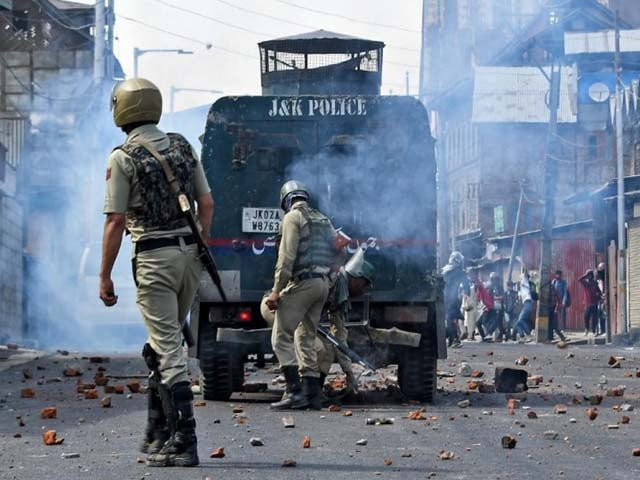Fernand de Varennes and Ahmed Shaheed, the United Nations (UN) Special Rapporteurs on minority issues and freedom of religion or belief respectively, published their concerns about Indian Illegally Occupied Jammu & Kashmir (IIOJK) last week. They criticised New Delhi’s August 2019 abrogation of Article 370 as “suggest[ing] the people of Jammu and Kashmir no longer have their own government and have lost power to legislate or amend laws in the region to ensure the protection of their rights as minorities.” The experts also warned that “The number of successful applicants for domicile certificates that appear to be from outside Jammu and Kashmir raises concerns that demographic change on a linguistic, religious and ethnic basis is already underway.” In response, India claimed that the report “calls into question the larger principles of objectivity and neutrality that the SRs are supposed by the Human Rights Council to adhere to.” Interestingly, all of this occurred while India took a group of 24 foreign Heads of Mission on a tour of the disputed region in order to attract more investment there.
No matter what India claims to the contrary, the UN experts’ concerns about IIOJK are valid. The very purpose of the region’s prior autonomy was to grant its people their own quasi-government, albeit under India’s ultimate control, in order to legislate and amend the laws of their region. Removing those already minuscule and largely symbolic rights literally took away their power to do that at the level that they’ve become accustomed to over the decades. This is not a subjective or partial observation but an easily verifiable statement of political fact. The same holds true about their concerns regarding what others have described as India’s demographic engineering. UNSC-recognised disputed territories aren’t allowed to have their demographics unnaturally altered, though this is now much more likely to happen ever since last year’s promulgation of India’s so-called “domicile law”. Although India claims not to have such an intent, there’s no denying that its recent administration changes nevertheless facilitate that possible outcome.
For these reasons, India is being dishonest by condemning the UN experts for allegedly lacking objectivity and neutrality. Even a casual familiarity with the facts discredits India’s claims, but New Delhi is desperate to push back against any criticism of its activities in Occupied Jammu & Kashmir because it fears that its foreign partners won’t invest there if they’re more well aware of what’s happening. The government believes that courting increased foreign investment into the region will result in normalising the post-annexation status quo after influential stakeholders realise that their interests are best served by remaining silent instead of taking India to task for unilaterally destabilising the situation in contravention of international law. It’s one thing for other countries to invest in disputed territories, and another entirely for them to do so when there are credible reports about massive human rights violations being carried out. These collectively include the state’s rampant violence and extrajudicial killings on top of anti-democratic trends and demographic engineering.
The problem with India’s policy is that it’s bound to fail because the world is already well aware of what’s happening in Occupied Jammu & Kashmir. The latest UN Special Rapporteur report proves this. Some countries might indeed decide to invest in those territories regardless of the credible humanitarian concerns involved as they pursue their self-interests, but it’s unlikely that many Western ones (which are among the most influential in the world) will follow their lead. To the contrary, Western countries tend to be more sensitive to democratic and humanitarian issues than their Global South counterparts, though that also doesn’t mean that they’ll endanger their bilateral relations with India out of solidarity with the Kashmiris. Rather, the most realistic scenario is that UN criticisms of India’s activities in Occupied Jammu & Kashmir will continue, Western nations will probably decline investing in those territories, but India’s bilateral ties with its many partners won’t be impacted much by these issues if at all.
What the Kashmiris and their international supporters must therefore do is keep up the global pressure on India through international fora like the UN and the media in order to prevent the normalisation of the post-annexation status quo by any of New Delhi’s partners. All countries and companies that decide to invest in Occupied Jammu & Kashmir must become targets of an intense information campaign that’s first aimed at drawing global attention to their controversial investments and then accuses them of turning a blind eye to credible reports of the massive human rights violations there if they refuse to reverse their course. The purpose in doing so is to impose immense reputational costs against those countries and companies that go along with India’s annexation and therefore contribute to the Kashmiris’ ever-worsening plight. Just like the Palestinian cause pioneered the Boycott, Divestment, Sanctions (BDS) movement, so too should the Kashmiri one do the same, and both should actually join forces in order to make their efforts more effective.



COMMENTS
Comments are moderated and generally will be posted if they are on-topic and not abusive.
For more information, please see our Comments FAQ